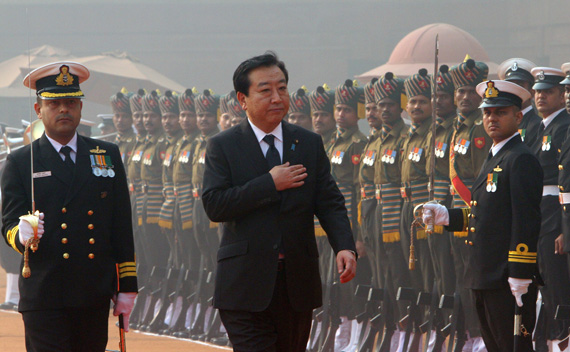Prime Minister Noda’s Year-end Strategic Tour
More on:

Unlike many of us, Japan’s prime minister did not sit back and rest at year’s end. Rather, Prime Minister Yoshihiko Noda took to the road to visit two of Asia’s ascending powers. He spent Christmas in Beijing, after a planned visit for earlier in December was unexpectedly postponed by China’s leaders. Yet it was his trip to New Delhi on December 27–28 that energized Tokyo’s diplomatic agenda.
Noda’s willingness to rearrange his schedule to accommodate China’s desire to change the summit dates reflects an awareness of the delicacy of the moment for Beijing. The original date of the summit coincided with the deeply painful anniversary of World War II atrocities, the day Japanese Imperial Army troops captured the city of Nanjing. Postponing a planned summit meeting may be unprecedented, yet it leaves us wondering why Beijing’s leaders did not appreciate the domestic impact of hosting Japan’s leader when they picked the date. That they saw fit to ask Tokyo to reschedule reveals perhaps a bit more confusion in Beijing than is usual. But it also reveals the efforts Japanese and Chinese governments together are making to get this important bilateral relationship back on a sound footing.
Meeting on December 26 allowed Prime Minister Noda and President Hu Jintao to focus on a much anticipated event, the death of Kim Jong-il and his succession by then underway in North Korea. As it has in the past, change in North Korea opened the way for Beijing and Tokyo to move beyond some of the more difficult bilateral issues between them and concentrate on their common interests in Northeast Asia. Prime Minister Noda had already declared his interest in sharing information with Beijing, and on consultations that would lead to regional cooperation on managing any issues that might arise as a result of instability on the Korean peninsula.
Yet it was the prime minister’s visit to India that suggested more immediate promise. Where often the Sino-Japanese relationship seems fraught, the Japan-India strategic partnership has been a source of growing potential for Tokyo. Economic relations are growing, although private sector investment by Japanese corporations seems slower than might be expected. Japan’s assistance to India in the construction of vital infrastructure projects, most notably the Delhi-Mumbai Industrial Corridor Project, has been consistent and of obvious importance to integrating India’s growing local economies. Japan too has found a ready partner in India for diversifying their access to rare earth materials, a stinging concern since the fall of 2010 when China abruptly reduced its exports to Tokyo of these vital metals.
Less appreciated is the growing strategic harmony between Japan and India. When I visited New Delhi in November, I was astounded at the extent of interest in the Indian strategic community in furthering the bilateral cooperation with Japan on everything from the development of space technology to nuclear cooperation and cyber security efforts. Already Japan and India have had five ministerial-level meetings to flesh out the contours of their new strategic partnership, and have agreed to institute a two-plus-two meeting each year to include defense and foreign ministers. The interaction between the Japanese and Indian militaries is also increasing, as the two navies have worked closely on anti-piracy and other maritime security missions. The armies have had several high-level exchanges, and will soon initiate staff talks. In 2012, the two nations’ air forces will also upgrade their consultations. The East Asia Summit provided an important opportunity to consider how Japan and India might work together to help shape the regional environment as well.
Tokyo and Delhi’s concerns about a rising China are certainly part of the impetus for the acceleration of strategic cooperation, and this has not gone unnoticed in Beijing. China’s military and media have been alert to this burgeoning strategic conversation between Delhi and Tokyo. I was surprised to find that even my discussion at the Observer Research Foundation, reported in Asian News International, got some air time as evidence of containment in the China Daily.
Yet Japan’s renewed diplomatic outreach is not all about China. It is clearly all about Japan, and its need for an active agenda of strategic engagement in Asia. As the prime minister’s China visit attests, Tokyo wants a strong relationship of strategic trust with Beijing. But perhaps that will take more time.
Prime Minister Noda’s diplomatic energy is reassuring, and signals clearly that he has his eye firmly on Japan’s strategic interests even as he seeks to work through the complex array of domestic issues on his agenda.
More on:
 Online Store
Online Store